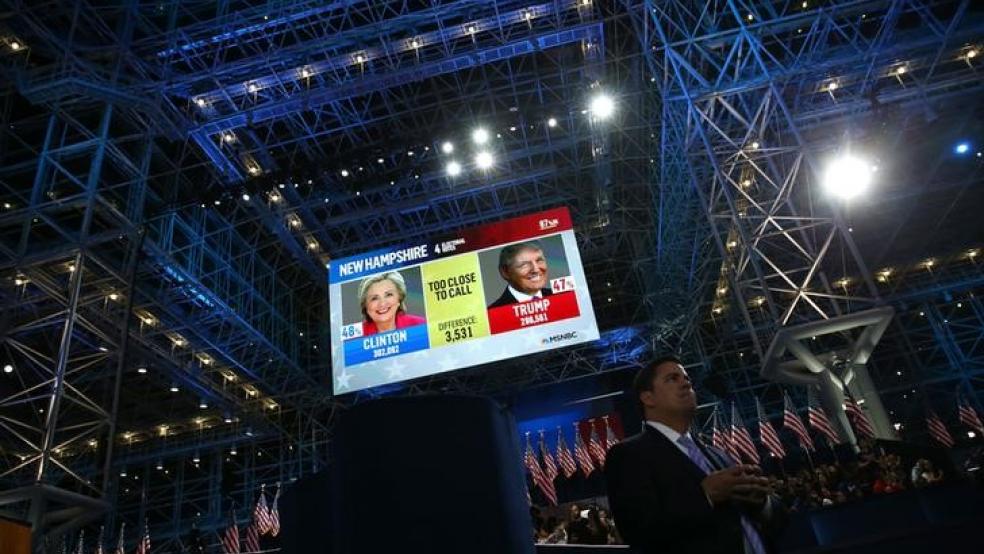WASHINGTON (Reuters) - Democrat Hillary Clinton's unexpected defeat in Michigan has laid bare growing voter anger over international trade, raising warning flags for her ahead of a possible presidential election showdown against Republican front-runner Donald Trump.
Trump has built his campaign on pledges to scrap international trade deals and do more to protect American workers from foreign competition, tapping the same groundswell of discontent that propelled Clinton's rival Bernie Sanders to victory in the Midwestern state on Tuesday.Clinton remains heavily favored to win the Democratic nomination. But the setback in Michigan could signal further troubles in upcoming primaries in other Rust Belt states such as Ohio, forcing her further to the left on economic issues and possibly influencing her choice for an eventual running mate, strategists said.The backlash against 20 years of trade liberalization has stalled the Trans Pacific Partnership (TPP), a sweeping Pacific trade deal backed by President Barack Obama and threatens to stymie the trade agenda for years to come."It's politically radioactive to support free trade right now," said Greg Valliere, a Washington analyst for Horizon Investments, a financial firm.Clinton's troubles with her party's left wing -- and with white, working class voters more generally -- may steer her toward a trade skeptic such as Senator Sherrod Brown of Ohio as a vice presidential running mate, said Democratic strategist Steve Jarding. Political pundits had expected Clinton to pick someone to increase her appeal to Hispanic or other minority voters, such as U.S. Housing and Urban Development Julian Castro.Sanders, 74, is unlikely to end up as Clinton’s running mate, partly due to his age, Democrats said.Both Sanders, a democratic socialist, and billionaire Trump have harnessed anti-trade sentiment in their insurgent White House bids, criticizing deals like NAFTA as job killers that have depressed the living standards of working Americans.Exit polls from Michigan, a hub of the U.S. auto industry, show widespread voter skepticism on trade that may have helped Sanders and Trump win their respective party primaries. "She made a fundamental mistake early on in this campaign to try to stay in the center," Democratic strategist Steve Jarding said of Clinton. "This cycle, there is no center."NUANCED TRADE STANCESanders campaigned heavily against foreign trade in a state that has been hammered by overseas competition since the 1980s. Some 58 percent of his supporters in Michigan exit polls said that trade takes away U.S. jobs, while a slight majority - 53 percent - of Clinton backers said trade creates U.S. jobs.The Economic Policy Institute, a left-leaning think tank, estimates that Michigan would lose 5 percent of its jobs if TPP were to take effect, the highest proportion of any state.Gary Hunley, a substitute teacher in Dearborn, Michigan, said he believed Clinton was partially to blame for stagnant wages because NAFTA was enacted under her husband Bill Clinton's presidency in the 1990s."She was not a passive first lady," Hunley said.Clinton's stance on trade is more nuanced than Trump's and Sanders'. After NAFTA was enacted, she voted against a free-trade deal with Central America while serving as a U.S. senator in the following decade.As Obama's secretary of state, Clinton helped negotiate the TPP with Japan, Vietnam and other Pacific Rim countries. As a presidential candidate, Clinton has said after reading the final language of the deal she would vote against it because it does not adequately protect U.S. workers. Clinton campaign manager Robby Mook told reporters Wednesday there were no plans to adjust her stance and that he would "put Secretary Clinton up against any candidate in this race on trade," including Trump. Despite backing by the Obama administration, Republican lawmakers and many business groups, Republican leaders in Congress have shown no sign that they will bring TPP up for a vote this year.The Obama administration says the deal has high labor and environmental standards that were not part of NAFTA. "I’m not sure that has fully been absorbed in the public mindset," U.S. National Security Adviser Susan Rice told Reuters. [L1N16H1VJ]The deal may fare no better under the next president. Sanders and Trump oppose TPP, and Senator Ted Cruz, who is in second place in the Republican contest, has said he would not vote for it this year."They've listened to the public and politicians have caught up with the public on this," Brown, the Ohio Democratic senator, told Reuters.The evidence that the TPP would help the U.S. economy much is less than conclusive.The Peter G. Peterson Institute, a pro-trade think tank, estimates that it would boost economic growth by just 0.5 percent after 15 years.The deal would not boost employment overall, but would result in a "churn" of 53,700 jobs lost and created each year, and it would boost incomes by 0.5 percent, the institute found. Another estimate by the Global Development and Environment Institute at Tufts University found the trade deal would slow growth by 0.54 percent after 10 years and cost 448,000 jobs in the United States. (Additional reporting by David Lawder, Amanda Becker, Valerie Volcovici, Richard Cowan, Roberta Rampton and John Whitesides; editing by Stuart Grudgings)Clinton's surprise Michigan loss exposes risks for her on trade

Lucy Nicholson



